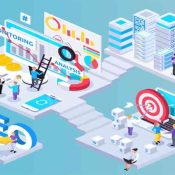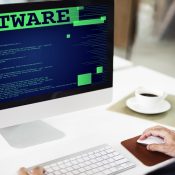
Hotel Management Software: Elevate Your Hospitality Operations
Success in the fast-paced, cutthroat hospitality sector depends on effective management. Hotel management software has become a game-changer, helping establishments to stay ahead of the curve, improve guest experiences, and streamline operations. Hotels no longer function the same way because to this potent technology, which has transformed everything from revenue management to housekeeping and front desk operations.
What is Hotel Management Software?
Hotel management software is a full range of tools and apps created especially for the hospitality sector. It includes modules and features that address several facets of hotel operations, such as revenue optimization, property management, and guest management. By acting as a consolidated platform, this software helps hotels effectively manage their operations and provide outstanding guest experiences.
Streamlining Operations: Key Features for Efficiency
Streamlining hotel operations is essential for delivering exceptional guest experiences and maximizing revenue. Here are key features that hotel management software should offer to enhance operational efficiency:
Reservation Management:
- Centralized reservation system for managing bookings across all channels.
- Automated booking confirmation emails and reminders to minimize no-shows.
- Calendar view with drag-and-drop functionality for easy reservation management.
Front Desk Operations:
- Quick check-in and check-out processes with digital guest registration.
- Integration with key card systems for seamless room access.
- Guest profile management for storing preferences and special requests.
Housekeeping Management:
- Housekeeping assignment and scheduling tools to optimize staff efficiency.
- Real-time room status updates for housekeeping staff to prioritize tasks.
- Maintenance tracking for identifying and resolving issues promptly.
Channel Management:
- Integration with online travel agencies (OTAs) and distribution channels for real-time inventory management.
- Automated rate and availability updates across all channels to maximize occupancy and revenue.
- Performance analytics to evaluate the effectiveness of each distribution channel.
Revenue Management:
- Dynamic pricing tools for adjusting room rates based on demand and market trends.
- Forecasting and reporting features to track revenue performance and identify opportunities for growth.
- Integration with revenue management systems for data-driven decision-making.
Guest Communication:
- Automated email and SMS notifications for booking confirmations, check-in instructions, and post-stay feedback requests.
- Two-way messaging functionality for addressing guest inquiries and requests in real-time.
- Personalized communication based on guest preferences and past interactions.
Reporting and Analytics:
- Customizable reports for analyzing key performance metrics such as occupancy, ADR (average daily rate), and RevPAR (revenue per available room).
- Business intelligence dashboards for visualizing data and identifying trends.
- Forecasting tools for predicting future demand and revenue opportunities.
Mobile Accessibility:
- Mobile-friendly interface for accessing the software from smartphones and tablets.
- Mobile check-in/out capabilities to streamline guest arrivals and departures.
- Push notifications for important alerts and updates.
Integration Capabilities:
- Seamless integration with third-party systems such as POS (point of sale), accounting, and CRM (customer relationship management) software.
- Open API (application programming interface) for custom integrations and interoperability with other hospitality solutions.
Two-way data sync to ensure consistency and accuracy across all integrated systems.
Training and Support:
- Comprehensive training resources and documentation for staff onboarding and ongoing education.
- 24/7 customer support for troubleshooting issues and resolving technical challenges.
- Regular software updates and enhancements to address user feedback and industry trends.
Enhancing Guest Experience: Innovative Features and Technologies
Hotels that want to differentiate themselves in a crowded market must prioritize improving the client experience. Hotel management software can include the following cutting-edge functions and technology to raise visitor satisfaction:
Mobile Check-in and Keyless Entry:
- Enable guests to check-in remotely via their mobile devices, reducing wait times at the front desk.
- Implement keyless entry systems that allow guests to access their rooms using mobile apps, enhancing convenience and security.
Personalized Guest Profiles:
- Create detailed guest profiles that capture preferences, special requests, and past stay history.
- Use artificial intelligence (AI) algorithms to analyze guest data and personalize their experiences based on individual preferences.
Virtual Concierge Services:
- Include chatbots or virtual assistants in the hotel’s mobile app or website to help customers around-the-clock.
- Offer recommendations for local attractions, dining options, and personalized services based on guest preferences.
In-Room Technology Enhancements:
- Install smart devices and IoT (Internet of Things) sensors in guest rooms to control lighting, temperature, and entertainment systems through voice commands or mobile apps.
- Provide streaming services, such as Netflix or Spotify, directly on in-room TVs for personalized entertainment options.
Contactless Payment Solutions:
- Implement contactless payment options, including mobile wallets and NFC (Near Field Communication) technology, to streamline the check-out process and minimize physical interactions.
- Offer secure payment portals integrated with the hotel management software for convenient and frictionless transactions.
Real-Time Service Requests:
- Enable guests to submit service requests, such as housekeeping or maintenance needs, through mobile apps or in-room tablets.
- Use automated routing and task assignment features to ensure prompt response and resolution of guest requests.
Digital Guest Feedback Surveys:
- Replace traditional paper-based feedback forms with digital surveys sent via email or SMS after check-out.
- Analyze guest feedback in real-time to identify areas for improvement and address concerns proactively.
Augmented Reality (AR) Experiences:
- Offer AR-enhanced experiences for guests, such as virtual tours of hotel facilities or interactive maps of local attractions.
- Provide AR-enabled guides that overlay information about points of interest directly onto guests’ smartphones or wearable devices.
Environmental Sustainability Initiatives:
- Implement eco-friendly practices, such as energy-efficient lighting, water-saving fixtures, and waste reduction programs.
- Use hotel management software to track and report on sustainability metrics, demonstrating the hotel’s commitment to environmental responsibility.
Voice-Activated Room Controls:
- Integrate voice recognition technology into guest rooms to control various amenities, including lights, blinds, and room temperature.
- Offer voice-activated virtual assistants that can provide information, answer questions, and fulfill guest requests.
Sustainability in Hospitality: How Hotel Management Software Contributes
So that it will lessen its influence at the surroundings and satisfy environmentally worried vacationers, the resort sector is setting increasingly more emphasis on sustainability measures. resort management software is vital to these initiatives because it makes it feasible for establishments to effectively undertake and display sustainable practices. the following are some approaches that lodge control software program enables the hospitality enterprise be greater sustainable:
Energy Management:
- Energy management systems and hotel management software can be integrated to track and regulate energy use across the facility.
- Automated controls, such as occupancy-based lighting and HVAC (heating, ventilation, and air conditioning) systems, help optimize energy consumption and reduce wastage.
Water Conservation:
- Through the use of data analytics, hotel management software can identify opportunities for water conservation, such as detecting leaks or inefficiencies in water usage.
- Integration with smart water management systems enables properties to track water consumption in real-time and implement measures to reduce usage.
Waste Management:
- Hotel management software facilitates waste management by providing tools for tracking waste generation, recycling efforts, and disposal practices.
- Properties can set up waste reduction programs and monitor progress through digital dashboards and reporting features.
Paperless Operations:
- By digitizing processes such as guest check-in, check-out, and invoicing, hotel management software helps reduce paper usage and minimize waste.
- Electronic document storage and communication platforms streamline operations while reducing the need for printed materials.
Supply Chain Management:
- Hotel management software includes features for managing procurement and inventory, enabling properties to source sustainable products and materials.
- Integration with suppliers and vendors facilitates transparency and accountability in the supply chain, ensuring adherence to sustainability standards.
Transportation Management:
- Some hotel management software solutions offer features for managing transportation services, such as shuttle buses or guest car rentals.
- By optimizing routes and scheduling according to demand, optimization algorithms can reduce fuel consumption and emissions.
Guest Engagement and Education:
- Hotel management software can facilitate guest engagement around sustainability initiatives through digital communication channels.
- Properties can use guest-facing platforms, such as mobile apps or in-room tablets, to educate guests about sustainability practices and encourage their participation.
Data Analysis and Reporting:
- Robust analytics capabilities within hotel management software allow properties to track key sustainability metrics, such as energy usage, water consumption, and waste generation.
- Data-driven decision-making is made possible by customizable reports and dashboards, which offer insights into performance patterns and areas for development.
Certifications and Compliance:
- Hotel management software can help establishments get and keep certifications related to sustainability, such Green Key or LEED (Leadership in Energy and Environmental Design).
- Compliance modules assist properties in making sure local, national, and international environmental laws and standards are followed.
Continuous Improvement:
- With the ability to collect and analyze data over time, hotel management software supports continuous improvement in sustainability efforts.
- Properties can identify successes and challenges, adjust strategies accordingly, and benchmark performance against industry peers to drive ongoing progress.
Data-Driven Decision Making: Leveraging Analytics and Insights
In brand new aggressive hospitality enterprise, statistics-pushed selection making is quintessential for optimizing operations, improving visitor reviews, and using revenue boom. hotel management software program plays a vital role in facilitating this method by way of presenting get entry to to comprehensive analytics and actionable insights. here’s how motel control software program enables properties to leverage analytics and insights for informed decision making:
Performance Metrics Tracking:
- Key performance indicators including occupancy rates, average daily rates, revenue per available room, and GOPPAR (gross operating profit per available room) may all be monitored by properties using hotel management software.
- Customizable dashboards provide real-time visibility into performance trends and variances, enabling stakeholders to monitor progress towards goals and targets.
Demand Forecasting:
- By analyzing historical booking patterns, market trends, and external factors, hotel management software helps properties forecast future demand with greater accuracy.
- Advanced forecasting algorithms use predictive analytics to anticipate fluctuations in demand and adjust pricing and inventory strategies accordingly.
Revenue Optimization:
- Hotel management software enables revenue managers to optimize pricing strategies based on demand forecasts, competitor analysis, and segment-specific trends.
- Dynamic pricing capabilities allow properties to adjust room rates dynamically in response to changes in demand and market conditions, maximizing revenue potential.
Guest Segmentation and Profiling:
- Through guest data collection and analysis, hotel management software enables properties to segment guests based on demographics, preferences, and booking behaviors.
- Segmented marketing campaigns and personalized offers tailored to specific guest segments enhance engagement and loyalty, driving repeat business and higher lifetime value.
Channel Performance Analysis:
- Hotel management software provides insights into the performance of distribution channels, including OTAs, direct bookings, and corporate channels.
- Properties can evaluate channel effectiveness, commission costs, and booking trends to optimize channel mix and allocation of resources.
Operational Efficiency Monitoring:
- Hotel management software tracks operational metrics related to housekeeping efficiency, maintenance response times, and guest satisfaction scores.
- Operational dashboards highlight areas of inefficiency or underperformance, enabling managers to identify root causes and implement corrective actions.
Marketing Effectiveness Evaluation:
- By integrating with marketing platforms and CRM systems, hotel management software measures the effectiveness of marketing campaigns and promotional activities.
- Attribution modeling and ROI analysis help properties assess the impact of marketing efforts on booking conversion rates and revenue generation.
Benchmarking and Competitive Analysis:
- Hotel management software facilitates benchmarking against industry peers and competitors by comparing performance metrics and market share data.
- Competitive analysis tools identify strengths, weaknesses, and opportunities for differentiation, informing strategic decision making and positioning in the market.
Trend Identification and Adaptation:
- Through data analysis and trend identification, hotel management software helps properties stay ahead of emerging market trends and guest preferences.
- In reaction to shifting consumer behavior and market conditions, properties might modify their product offerings, services, and marketing plans.
Continuous Improvement Initiatives:
- Hotel management software supports a culture of continuous improvement by providing insights into areas for optimization and innovation.
- Properties can use data-driven feedback loops to measure the impact of operational changes and initiatives, fostering a cycle of learning and adaptation.
Personalization in Hospitality: Tailoring Experiences with Software Solutions
In the hospitality sector, personalization has become essential, enabling properties to offer their customers distinctive and unforgettable experiences. Using automation technologies and guest data, hotel management software is essential for supporting personalization efforts. The following is how digital solutions allow for customized hospitality experiences:
Guest Profiling and Preferences:
- Hotel management software captures and maintains detailed guest profiles, including preferences, special requests, and past stay history.
- Properties can use this data to personalize guest interactions, from room assignments to in-room amenities and services.
Customized Booking Experiences:
- Through dynamic booking engines and user-friendly interfaces, hotel management software offers personalized booking experiences tailored to individual guest preferences.
- Guests can customize their stays by selecting room types, amenities, and add-on services based on their preferences and requirements.
Automated Communication:
- Software solutions automate communication with guests before, during, and after their stays, providing personalized messages, confirmations, and post-stay follow-ups.
- Automated emails, SMS messages, and mobile app notifications enhance guest engagement and satisfaction by addressing their specific needs and preferences.
Targeted Marketing Campaigns:
- Hotel management software integrates with CRM (customer relationship management) systems to segment guests based on demographics, booking behaviors, and preferences.
- Properties can design targeted marketing campaigns and promotions to reach specific guest segments with personalized offers and incentives.
Room Customization and Amenities:
- With software solutions, properties can offer guests the option to personalize their rooms and amenities before arrival, such as pillow preferences, room temperature settings, and favorite snacks or beverages.
- Integrated guest preferences management systems ensure that staff can deliver personalized experiences consistently across all touchpoints.
Enhanced Loyalty Programs:
- Hotel management software supports loyalty programs by tracking guest activity, rewarding loyalty points, and offering personalized rewards and incentives.
- Guests receive personalized offers, upgrades, and exclusive perks based on their loyalty status and past engagement with the property.
Predictive Recommendations:
- By analyzing guest data and behaviors, software solutions can provide predictive recommendations for personalized experiences and activities.
- From restaurant recommendations to local attractions and spa services, properties can anticipate guest preferences and tailor recommendations accordingly.
Real-Time Feedback and Resolution:
- Hotel management software facilitates real-time feedback collection and resolution, allowing guests to provide input and requests during their stays.
- Properties can address guest concerns and preferences promptly, enhancing satisfaction and loyalty through personalized service recovery.
Post-Stay Engagement:
- Software solutions enable properties to continue engaging with guests after their stays through personalized follow-up communications and offers.
- Publish-live surveys, loyalty software updates, and focused promotions inspire repeat visits and foster lengthy-time period relationships with guests.
Continuous Improvement:
- By analyzing guest feedback, preferences, and satisfaction scores, hotel management software supports continuous improvement initiatives.
- Properties can identify trends, areas for enhancement, and opportunities for innovation to enhance personalized experiences further and exceed guest expectations.
Top Hotel Management Software
Cloudbeds
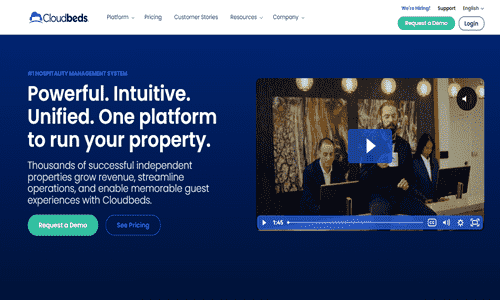
Cloudbeds is an all-in-one inn management platform that combines assets control, channel control, and booking engine skills in a single answer. it’s miles designed to streamline operations and maximize revenue for resorts, hostels, and vacation leases.
Pros:
- Comprehensive suite of features for managing reservations, inventory, and guest communications.
- Seamless integration with major OTAs (Online Travel Agencies) and distribution channels.
- User-friendly interface and intuitive dashboard for easy navigation and management.
Cons:
- Pricing may be higher as compared to a few other solutions, specifically for smaller residences.
- Limited customization options for certain features.
Services Provided:
- Property management
- Channel management
- Booking engine
- Revenue management
- Guest communication tools
Pricing Package:
- Custom pricing based on property size and specific requirements.
Opera PMS by Oracle

Opera PMS (Property Management System) by Oracle is a widely used hotel management software solution that offers comprehensive tools for front office operations, reservations, and guest services. It is suitable for hotels of all sizes, from small independent properties to large chains.
Pros:
- Extensive range of features for managing reservations, check-ins, and housekeeping tasks.
- Scalable solution that may be custom designed to meet the needs of individual houses.
- Integration with other Oracle Hospitality solutions for enhanced functionality.
Cons:
- Requires training and familiarization due to its extensive feature set.
- Better preliminary setup charges compared to a few other solutions.
Services Provided:
- Front office management
- Reservations and booking management
- Housekeeping management
- Guest services
Pricing Package:
- Custom pricing based on property size and specific requirements.
Guesty
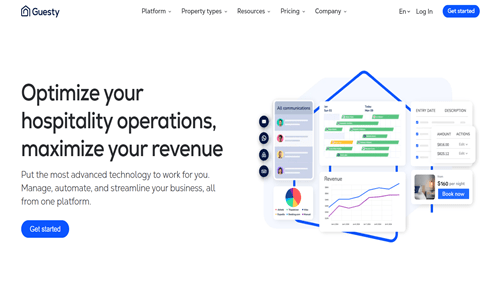
Guesty is a belongings control platform specifically designed for short-term condo residences, consisting of holiday leases and Airbnb listings. It gives tools for managing reservations, guest conversation, and property maintenance.
Pros:
- Specialized features for managing short-term rentals, including automated messaging and task assignment.
- Seamless integration with Airbnb, Booking.com, and other major booking platforms.
- Robust reporting and analytics tools for tracking performance and revenue.
Cons:
- May need some features for full-service hotels or larger properties.
- Pricing may be higher for properties with a large number of listings or units.
Services Provided:
- Reservation management
- Channel management
- Guest communication
- Task and maintenance management
Pricing Package:
- Custom pricing based on property size and specific requirements.
Frontdesk Anywhere
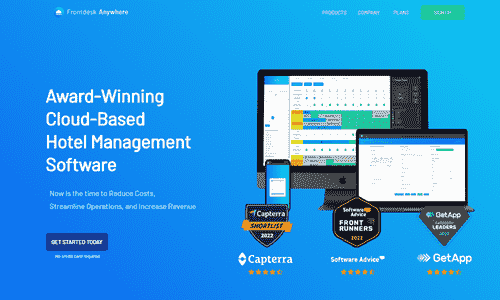
Front desk Anywhere is a cloud-based motel management software program solution designed for impartial resorts, boutique houses, and inns. It offers functions for managing reservations, test-ins, housekeeping, and visitor communications.
Pros:
- User-friendly interface with drag-and-drop functionality for easy reservation management.
- Integration with major OTAs and distribution channels for seamless booking management.
- Mobile-friendly design for on-the-go access and management.
Cons:
- Restricted customization preferences as compared to a few different answers.
- may not be suitable for larger inn chains or residences with complicated necessities.
Services Provided:
- Reservation management
- Front desk operations
- Housekeeping management
- Reporting and analytics
Pricing Package:
- Custom pricing based on property size and specific requirements.
Maestro PMS

Maestro PMS is a fully integrated property management system designed for luxury hotels, resorts, and multi-property groups.It gives a huge variety of features for the front office operations, guest services, and revenue management.
Pros:
- Highly customizable platform with flexible configuration options to meet unique property requirements.
- Comprehensive suite of features, including CRM, loyalty programs, and online booking engine.
- Robust reporting and analytics tools for tracking performance and optimizing revenue.
Cons:
- Higher initial setup costs and ongoing maintenance fees compared to some other solutions.
- Requires training and expertise to fully utilize its extensive feature set.
Services Provided:
- Front office management
- Reservations and booking management
- Guest services and CRM
- Revenue management
Pricing Package:
- Custom pricing based on property size and specific requirements.
InnQuest

InnQuest offers hotel management software solutions designed for independent hotels, resorts, and boutique properties. Its flagship product, roomMaster, provides comprehensive features for front office operations, reservations, and guest services.
Pros:
- Intuitive user interface with customizable dashboards for efficient front desk operations.
- Seamless integration with leading OTAs and distribution channels for effective online booking management.
- Robust reporting and analytics tools for tracking performance and optimizing revenue.
Cons:
- May require additional modules or add-ons for specific features, leading to higher costs.
- Limited scalability for larger hotel chains or properties with complex requirements.
Services Provided:
- Front office management
- Reservations and booking management
- Guest services
- Reporting and analytics
Pricing Package:
- Custom pricing based on property size and specific requirements.
WebRezPro
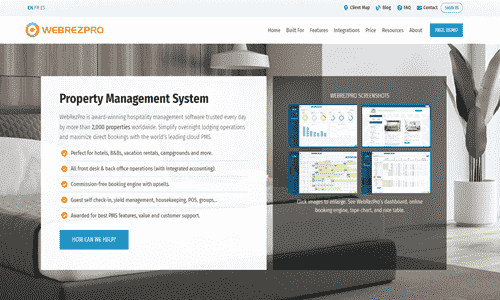
WebRezPro is a cloud-based hotel management system designed for independent hotels, vacation rentals, and boutique properties. It gives a huge range of functions for dealing with reservations, test-ins, home tasks, and visitor communications.
Pros:
- User-friendly interface with customizable templates for easy reservation management.
- Integration with major booking platforms and payment gateways for seamless online bookings and payments.
- Mobile-friendly design allows for on-the-go access and management from any device.
Cons:
- Restrained customization picks as compared to some other solutions.
- won’t be appropriate for large resort chains or homes with complicated requirements.
Services Provided:
- Reservation management
- Front desk operations
- Housekeeping management
- Guest communication
Pricing Package:
Custom pricing based on property size and specific requirements.
Clock PMS+
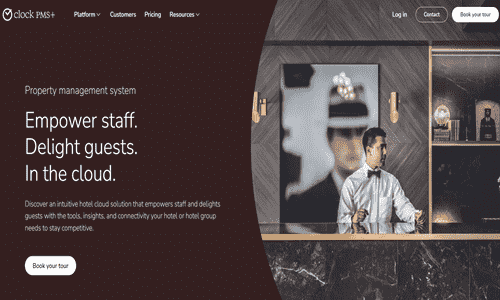
Clock PMS+ is a comprehensive hotel management system suitable for hotels, resorts, and hotel chains of all sizes. It offers features for front office operations, reservations, housekeeping, and revenue management.
Pros:
- Flexible and customizable platform with modular architecture to meet specific property requirements.
- Seamless integration with third-party systems, including POS (Point of Sale) and accounting software.
- Advanced revenue management tools for optimizing pricing and maximizing revenue.
Cons:
- Initial setup and configuration may require technical expertise.
- Higher initial investment compared to some other solutions.
Services Provided:
- Front office management
- Reservations and booking management
- Housekeeping management
- Revenue management
Pricing Package:
- Custom pricing based on property size and specific requirements.
MSI CloudPM
MSI CloudPM is a cloud-based property management system designed for hotels, resorts, and multi-property groups. It offers features for front office operations, reservations, guest services, and revenue management.
Pros:
- Scalable solution suitable for properties of all sizes, from independent hotels to large chains.
- Easy-to-use interface with customizable dashboards for efficient operations management.
- smooth interaction with external systems, such as CRM platforms and payment gateways.
Cons:
- Limited customization options for certain features.
- May require additional modules for advanced functionality, leading to higher costs.
Services Provided:
- Front office management
- Reservations and booking management
- Guest services
Revenue management
Pricing Package:
Custom pricing based on property size and specific requirements.
Hotelogix
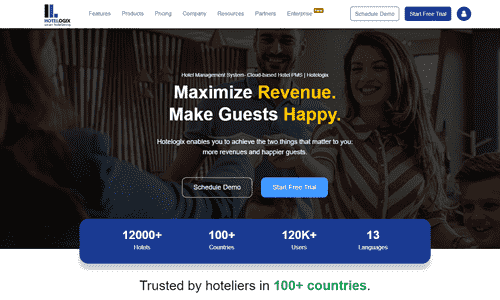
For small and mid-sized hotels, motels, and bed and breakfasts, Hotelogix is a cloud-based hotel management system. It has functions for housekeeping, reporting, internet reservations, and front desk operations.
Pros:
- Affordable pricing plans are suitable for smaller properties with limited budgets.
- Easy-to-use interface with drag-and-drop functionality for efficient reservation management.
- Integration with major booking platforms and payment gateways for seamless online bookings and payments.
Cons:
- Limited scalability for larger hotel chains or properties with complex requirements.
- Some advanced features may be available only in higher-tier pricing plans.
Services Provided:
- Front office management
- Online bookings
- Housekeeping management
- Reporting and analytics
Pricing Package:
- Tiered pricing plans based on property size and specific requirements.
Integration with IoT: Creating Smart Hotels of the Future
The hospitality sector is undergoing a change because to the Internet of Things (IoT), which makes it possible to build smart hotels that provide visitors with more convenience, efficiency, and customized experiences. The integration of IoT devices and systems into hotel management software is essential for transforming conventional hotels into cutting-edge, tech-forward businesses. The following is how IoT integration is influencing the hotel industry going forward:
Automated Room Controls:
- Hotel management software integrates with IoT devices to enable automated room controls, allowing guests to adjust lighting, temperature, and entertainment systems using smartphones or voice commands.
- Automated room controls lower energy usage and operating expenses for the hotel while improving visitor comfort and convenience.
Smart Energy Management:
- IoT sensors and smart thermostats integrated with hotel management software optimize energy usage by adjusting HVAC systems and lighting based on occupancy levels and guest preferences.
- Properties can monitor energy consumption in real-time and identify opportunities for further efficiency improvements through data analytics.
Enhanced Security and Access Control:
- IoT-enabled door locks and access control systems integrated with hotel management software provide secure and convenient access to guest rooms and common areas.
- Properties can remotely monitor and manage access permissions, track entry and exit logs, and issue digital keys to guests for contactless check-in and check-out.
Personalized Guest Experiences:
- IoT devices, such as wearables and beacons, connected to hotel management software enable personalized experiences by delivering targeted notifications, offers, and recommendations based on guest preferences and location.
- Properties can offer curated experiences, such as guided tours or special amenities, tailored to individual guest interests and behaviors.
Efficient Housekeeping Operations:
- IoT sensors installed in guest rooms and common areas transmit real-time data to hotel management software, enabling efficient housekeeping operations.
- Housekeeping staff receive alerts and notifications for room cleaning based on occupancy status, ensuring timely service delivery and optimizing staff productivity.
Predictive Maintenance:
- IoT sensors built into facilities and equipment track performance parameters constantly and identify possible problems before they get worse.
- Hotel management software analyzes sensor data to predict maintenance needs, schedule preventive maintenance tasks, and minimize downtime for critical systems.
Smart Guest Services:
- IoT devices integrated with hotel management software enable smart guest services, such as voice-activated assistants, virtual concierge services, and in-room tablets for accessing hotel information and services.
- Guests can use IoT-enabled devices to request services, make reservations, and interact with hotel staff, enhancing their overall stay experience.
Contactless Payment and Transactions:
- IoT-enabled payment terminals and mobile payment solutions integrated with hotel management software enable contactless payment and transactions throughout the property.
- Guests can pay for services, amenities, and purchases using smartphones, wearables, or digital wallets, reducing the need for physical cash or credit cards.
Real-Time Monitoring and Alerts:
- IoT sensors are used in a variety of hotel facilities to monitor environmental factors in real time, including humidity, noise levels, and air quality.
- Hotel management software generates alerts and notifications for anomalies or deviations from preset thresholds, enabling prompt response and resolution by staff.
Data Analytics and Insights:
- Hotel management software obtains meaningful insights into guest behavior, preferences, and operational performance by gathering and evaluating data from Internet of Things devices.
- Properties can use data analytics to optimize processes, improve service quality, and make data-driven decisions that enhance the overall guest experience.
Mobile Solutions: Managing Hotels on the Go
In today’s fast-paced hospitality industry, mobile solutions have become indispensable tools for hotel managers and staff to efficiently manage operations, enhance guest experiences, and stay connected while on the go. Hotel management software equipped with mobile capabilities empowers users to access critical information, perform essential tasks, and provide seamless service from anywhere, at any time. Here’s how mobile solutions are revolutionizing hotel management:
Remote Access to Property Information:
- Hotel management software with mobile capabilities allows managers to access real-time property data, including occupancy rates, reservations, and revenue figures, from their smartphones or tablets.
- Managers can stay informed about property performance and make data-driven decisions, even when away from the office or on the move.
Efficient Front Desk Operations:
- Mobile check-in and check-out functionalities integrated into hotel management software streamline front desk operations and reduce guest wait times.
- Front desk staff can greet guests upon arrival, verify identification, process payments, and issue room keys—all from a mobile device, without the need for traditional desk setups.
On-the-Go Housekeeping Management:
- Housekeeping staff equipped with mobile devices can receive real-time updates on room statuses, cleanliness requirements, and guest requests.
- Mobile solutions enable housekeeping supervisors to assign tasks, track progress, and prioritize room cleaning based on occupancy and guest preferences.
Instant Communication and Collaboration:
- Mobile solutions facilitate instant communication and collaboration among hotel staff through messaging platforms, voice calls, and video conferencing features.
- No matter where they are in the building, staff members may easily assign work, communicate updates, and address problems.
Personalized Guest Services:
- Mobile-enabled hotel management software empowers staff to deliver personalized guest services and amenities, such as room upgrades, dining reservations, and special requests, directly from their mobile devices.
- Guests receive prompt assistance and tailored recommendations, enhancing their overall experience and satisfaction.
Mobile Concierge Services:
- Hotel management software integrated with mobile concierge apps provides guests with instant access to information about hotel facilities, local attractions, transportation options, and dining recommendations.
- Guests can explore and book services, activities, and experiences through their smartphones, enhancing convenience and engagement.
Contactless Payment Solutions:
- Mobile payment capabilities integrated into hotel management software enable contactless transactions for guests, allowing them to settle bills, make purchases, and request additional services using their smartphones or mobile wallets.
- Contactless payment solutions enhance security, speed up transactions, and minimize physical interactions, aligning with current health and safety standards.
Real-Time Performance Monitoring:
- Hotel managers can monitor key performance indicators (KPIs) and operational metrics in real time through mobile dashboards and reports.
- Mobile solutions provide instant insights into revenue trends, occupancy levels, guest satisfaction scores, and other critical metrics, empowering managers to take proactive measures and address issues promptly.
Remote Staff Training and Support:
- Mobile-enabled training modules and support resources allow hotel staff to access educational materials, tutorials, and troubleshooting guides on their mobile devices.
- Staff members can complete training modules, seek assistance, and stay updated on operational procedures, enhancing their skills and efficiency while on the go.
Continuous Improvement and Innovation:
- Mobile solutions facilitate feedback collection from guests and staff, enabling properties to gather insights, identify areas for improvement, and drive innovation.
- Properties can use mobile platforms to solicit feedback, conduct surveys, and implement enhancements that enhance the guest experience and operational efficiency.
Security and Compliance: Ensuring Data Protection and Regulation Adherence
Hoteliers in the hospitality sector have a great deal of responsibility when it comes to protecting visitor data and following laws like the California Consumer Privacy Act (CCPA) and the General Data Protection Regulation (GDPR). Hotel management software is essential for protecting confidential data and adhering to data protection regulations. The following is how hotel management software maintains compliance and security:
Data Encryption and Secure Storage:
- Hotel management software utilizes advanced encryption protocols to protect sensitive guest data, such as personal information, payment details, and booking records.
- The chance of undesirable access or records breaches is reduced way to encrypted garage solutions, which assure that statistics is secure each in transit and at relaxation.
Role-Based Access Controls:
- Based on user responsibilities and permissions, hotel management software’s role-based access controls (RBAC) limit access to critical information and functionalities.
- Only authorized personnel are able to view or alter sensitive information because they have been granted the proper access permissions.
Secure Payment Processing:
- Included charge gateways within lodge control software program observe PCI DSS (fee Card industry facts protection popular) requirements for impenetrable fee processing.
- Guest payment information is tokenized and processed securely, reducing the risk of cardholder data theft or fraudulent transactions.
Auditing and Logging Mechanisms:
- Hotel management software maintains comprehensive audit logs of user activities, system events, and data access attempts.
- Auditing mechanisms track changes to sensitive data, monitor user login attempts, and provide visibility into system usage for compliance purposes.
Regular Software Updates and Patches:
- Software program providers frequently release updates and patches to cope with protection vulnerabilities and mitigate functionality dangers.
- Hotel management software automatically applies updates to ensure that systems are protected against emerging threats and compliance requirements are met.
Data Retention and Deletion Policies:
- Hotel management software implements data retention and deletion policies in accordance with regulatory requirements and industry best practices.
- Visitor records is retained just for the indispensable length and securely deleted whilst no longer wanted, decreasing the hazard of unauthorized get admission to or misuse.
GDPR and CCPA Compliance Features:
- Hotel management software includes features and functionalities designed to facilitate GDPR and CCPA compliance, such as data subject access requests (DSAR) handling and consent management.
- Homes can configure settings in the software program to ensure compliance with privateness rules and reply to guest requests for statistics get entry to or deletion.
Staff Training and Awareness Programs:
- Hotel management software providers offer training and awareness programs to educate staff members about security best practices, regulatory requirements, and data protection protocols.
- Staff training programs ensure that employees understand their roles and responsibilities in safeguarding guest data and maintaining compliance.
Third-Party Vendor Management:
- Vendors of hotel management software thoroughly evaluate outside suppliers and service providers to make sure they follow regulations and security guidelines.
- Contracts and agreements with third-party vendors include provisions for data protection, confidentiality, and compliance oversight.
Incident Response and Breach Management:
- Hotel management software includes incident response plans and protocols for managing security incidents, data breaches, and privacy violations.
- Properties can quickly detect, contain, and mitigate security incidents through predefined workflows and escalation procedures.
Future Outlook: Emerging Trends and Technologies in Hotel Management Software
It is anticipated that hotel management software will significantly improve to satisfy the evolving demands and preferences of both hoteliers and visitors as the hospitality sector continues to change. The following new developments have the potential to influence how hotel management software is developed in the future:
Artificial Intelligence (AI) and Machine Learning:
- Algorithms driven by artificial intelligence and machine learning models will be essential for streamlining hotel operations, customizing visitor experiences, and forecasting demand trends.
- AI-driven chatbots and virtual assistants will enhance guest communication and support staff in addressing inquiries and requests efficiently.
Internet of Things (IoT) Integration:
- Greater integration with IoT devices will transform hotels into smart, interconnected spaces where guest preferences and operational efficiencies are seamlessly managed.
- IoT sensors will monitor room conditions, automate energy usage, and enable personalized services based on guest behaviors and preferences.
Blockchain Technology for Data Security:
- Blockchain technology is going to be used more and more in hotel management software to improve data security, transparency, and trust.
- Immutable blockchain ledgers will secure guest identities, streamline payment transactions, and ensure compliance with data protection regulations.
Voice-Enabled Interfaces and Smart Assistants:
- Voice-enabled interfaces and smart assistants will become ubiquitous features of hotel management software, allowing guests to control room amenities and access services using voice commands.
- Integration with virtual assistants like Amazon Alexa and Google Assistant will enhance guest convenience and elevate the overall guest experience.
Applications of Virtual Reality and Augmented Reality:
- AR and VR technologies will revolutionize guest engagement and marketing efforts within hotel management software.
- Guests will use AR-enabled devices to visualize room layouts, explore hotel amenities, and preview destination experiences before booking.
Enhanced Data Analytics and Predictive Insights:
- Advanced data analytics capabilities will provide hoteliers with deeper insights into guest preferences, market trends, and operational performance.
- Predictive analytics models will forecast demand fluctuations, optimize pricing strategies, and anticipate guest needs, enabling proactive decision-making.
Mobile-First Solutions and Contactless Experiences:
- Mobile-first hotel management software solutions will cater to the growing demand for contactless experiences and seamless mobile interactions.
- Guests will use mobile apps for contactless check-in/out, digital key access, mobile payments, and personalized concierge services.
Robotic Process Automation (RPA) for Operational Efficiency:
- Robotic process automation (RPA) will automate repetitive tasks and streamline operational workflows within hotel management software.
- Robots and automated systems will handle back-office functions, inventory management, and guest service requests, freeing up staff to focus on delivering exceptional experiences.
Enhanced Integration Capabilities with Ecosystem Partners:
- Hotel management software will offer enhanced integration capabilities with ecosystem partners, including third-party vendors, service providers, and distribution channels.
- Seamless integrations will enable properties to access a broader range of services, optimize revenue streams, and deliver seamless guest experiences across touchpoints.
Focus on Sustainability and Green Initiatives:
- Hotel management software will incorporate features to support sustainability initiatives and green practices, such as energy-efficient operations, waste reduction programs, and carbon footprint tracking.
- Sustainability metrics and reporting tools will enable properties to measure and communicate their environmental impact, aligning with guest preferences for eco-friendly accommodations.
FAQs
How can hotel management software improve operational efficiency for hotel staff?
Numerous operational duties, including bookings, check-ins, cleaning assignments, and invoicing procedures, are streamlined by hotel management software. Staff members can save time, cut down on mistakes, and concentrate more on providing outstanding guest experiences by automating these operations.
Is hotel management software suitable for different types of properties, such as boutique hotels, resorts, and large chains?
Indeed, hotel management software is made to meet the different requirements of different kinds of properties, ranging from big resorts and chains to tiny boutique hotels. The software scales appropriately to accommodate properties of all sizes and configurations and may be tailored to meet individual needs.
How does hotel management software ensure data security and protect sensitive guest information?
To protect visitor data, hotel management software uses strong security features including encryption, access controls, and frequent security updates. In order to guarantee adherence to data protection laws and preserve the privacy of visitor information, the software also complies with industry norms and regulations.
Can hotel management software integrate with other systems and platforms, such as online booking engines and payment gateways?
Certainly, a variety of platforms and systems, such as online booking engines, payment gateways, channel managers, and property management systems (PMS), can be integrated with hotel management software. Properties can improve distribution channels, expedite operations, and offer a consistent guest experience with seamless interfaces.
How does hotel management software support revenue management strategies and pricing optimization?
Hotel management software provides revenue management tools and analytics that enable properties to analyze market trends, track competitor pricing, and forecast demand. Revenue managers can leverage these insights to adjust pricing strategies dynamically, maximize revenue, and optimize room inventory allocation.
Can hotel management software help properties enhance guest satisfaction and loyalty?
Yes, hotel management software facilitates personalized guest interactions, automates guest communication, and enables the delivery of tailored services and amenities. By understanding guest preferences and behaviors, properties can create memorable experiences, build guest loyalty, and generate positive reviews and referrals.
Conclusion
In conclusion, hotel management software will play a critical role in determining how the hospitality sector develops in the future. Software solutions are becoming more and more essential for streamlining operations, improving visitor experiences, and guaranteeing regulatory compliance as technology develops and guest expectations change. Hotel management software provides features like AI-driven customization and IoT-enabled smart hotel capabilities. These features enable properties to adjust to changing market dynamics, increase efficiency, and provide unmatched service. Hoteliers can stay ahead of the curve, improve their services, and keep a competitive edge in the ever-changing hospitality industry by embracing innovative trends and technologies. Ultimately, hotel management software serves as a catalyst for innovation, efficiency, and excellence in hospitality management, driving positive outcomes for both guests and property owners alike.



